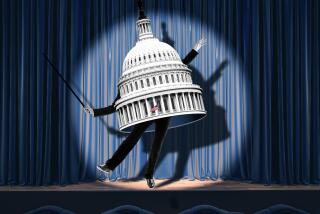Administration Turns Up Heat on Arts Funding : Politics: President Bush appears to be wavering on his adamant no-strings support for the renewal of NEA subsidies.
- Share via
WASHINGTON — The Bush Administration, responding to conservative pressure Tuesday, denounced NEA funding of “obscene art,” reheating a controversy that White House officials had been trying in recent weeks to quiet.
“This is a subsidy issue, and we need to speak out against subsidies--by the federal taxpayers--for this kind of art,” White House spokesman Marlin Fitzwater said after Bush met with Republican congressional leaders to discuss several topics.
“You cannot--should not--provide federal subsidies for this kind of obscene art,” Fitzwater added.
Fitzwater’s comments appeared to raise the possibility that President Bush was waffling on his previously adamant support for NEA renewal without censorship-like restrictions.
Fitzwater insisted, however, that the Administration’s formal position has not changed.
“We still support the clean extension,” he said. But, he added, “the problem needs to be dealt with.”
“Our position has been that (NEA chairman John Frohnmayer) can do that. But on the other hand, Helms and others have got amendments to get at that--some are good, some are bad.” (North Carolina Republican Sen. Jesse Helms has been the NEA’s chief opponent in the controversy.)
Fitzwater’s remarks came as the House and Senate prepared to act on two different bills to extend the life of the arts endowment for a term of as much as five more years. Last week, the White House floated a vague proposal to shorten the term to as little as one year as a means of defusing the controversy for the remainder of the 1990 campaign season.
A Senate subcommittee is tentatively scheduled to meet today, although no debate is expected. Under a deal struck by Democratic and Republican leaders of the subcommittee, Senate action will be reserved for a session next week of the full Education and Labor Committee chaired by Sen. Claiborne Pell (D-R.I.).
In the House, a spokesman for the subcommittee chaired by Rep. Pat Williams (D-Mont.) said late Tuesday that a scheduled meeting today had been canceled and that, on the instructions of Rep. Augustus Hawkins (D-Los Angeles), chair of the House Education and Labor Committee, the NEA matter would be taken up by the full panel next week with no subcommittee debate. The unusual approach was apparently due, congressional sources said, to concerns over attempts by Rep. Paul Henry (R-Mich.) to force severe content-control language into the subcommittee version of the bill .
The strategy by Hawkins was unusual, but far from unprecedented, these sources said. The tactic apparently underscored the unstable nature of the NEA debate and added emphasis to a possible shift in the debate back to a focus on attempts to more sharply curtail the content of work the arts endowment can fund.
Earlier this week, Henry, an influential member of the House subcommittee, suggested that Frohnmayer could come under Republican pressure to resign if he continues to refuse to support restrictive language in the endowment’s reauthorization.
Frohnmayer was on Capitol Hill Tuesday afternoon for a series of meetings with congressmen and senators. Among his scheduled stops was a meeting with Henry to discuss the increasingly uncertain issue of restrictive language.
Asked specifically if the Administration would oppose all amendments to the NEA legislation in the interests of getting a “clean extension,” Fitzwater demurred. “I don’t know whether we’ve got a position on each amendment or not, I suppose we’d have to,” he said.
It was believed that the White House may be moving toward acceptance of statutory language intended to make it difficult for the NEA to support works like the controversial photograph “Piss Christ,” that depicted a crucifix immersed in urine.
House Republicans on the NEA reauthorization subcommittee have--until now--appeared willing to accept content restrictions dealing only with obscene work. Arts organizations--including the United Art Group, a consortium of arts organizations formed by Williams--have resisted imposition of any language that would restrict artistic subject matter.
Several legal experts interviewed by The Times agree that existing U.S. Supreme Court definitions of obscenity would have had no effect on the crucifix image, by New York photographer Andres Serrano, and probably could not construe as obscene a series of controversial, sexually explicit images by the late photographer Robert Mapplethorpe. The two artists, who have had work supported by NEA grants, have been singled out by conservative opponents of the endowment.
Conservatives in Congress--led by Helms--have been pushing legislation that would further limit what sorts of art the NEA may fund. The Administration, by contrast, has been backing a plan to simply reauthorize the NEA without any specific legislative provision on the controversy.
At the arts endowment, meanwhile, Frohnmayer declined to comment on a proposal by a member of the National Council on the Arts that Frohnmayer call an emergency meeting of the NEA’s 24-member advisory board to discuss the agency’s persistent and deepening political problems.
Jacob Neusner, a national council member from the Institute for Advanced Study at Princeton University, made the proposal to Frohnmayer in a letter dated June 5 and received by The Times on Tuesday. Neusner proposed that the emergency session occur before the end of June.
More to Read
Get the L.A. Times Politics newsletter
Deeply reported insights into legislation, politics and policy from Sacramento, Washington and beyond. In your inbox twice per week.
You may occasionally receive promotional content from the Los Angeles Times.








